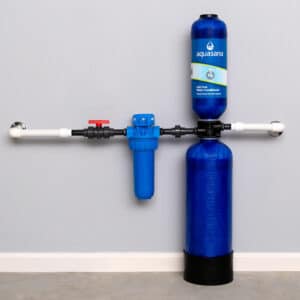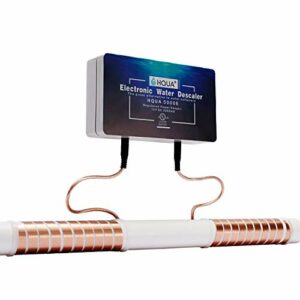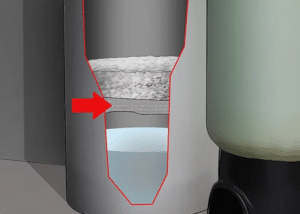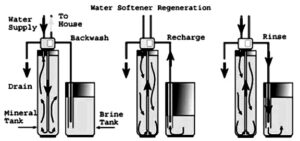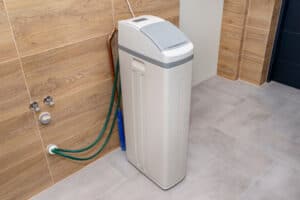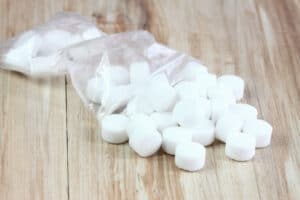When gardening, you’ll want to make sure you supply your plants with clean and safe water to help them grow. Regular tap water has chloramine and chlorine levels that could harm your garden, so you will need a garden hose filter to protect your plants from these detrimental chemicals.
A garden hose filter can help you grow a bountiful garden by keeping your soil fertile and supplying your plants with the necessary nutrients to grow.
When evaluating inline garden hose filters, we determined the best garden hose water filter to be the AquaOx DF7, a highly efficient filter that can provide 100,000 gallons of water!.
See Related Article: Best Inline Water Filters
The Best Garden Hose Filters
Here are some of the best garden hose water filtration systems available today. We will discuss their benefits, drawbacks, and differences from other options.
1. AquaOX Garden Hose Filter
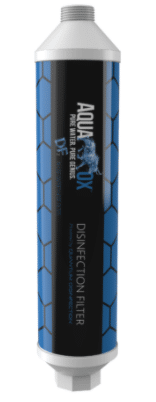
In our opinion, The best garden hose water filter is AquaOx DF7, which connects to your garden hose to provide 100,000 gallons of water. This filter kills 99.999% of bacteria and viruses in your water, making it safe enough to use on your plants. It prevents disease and won’t kill the pollinators in your backyard, and you can use it on its own or in addition to a pre-existing filtration system.
This water filter for garden hose has Quantum Disinfection (QD) technology to kill bacteria. QD uses electron movement to create positively charged surfaces that destroy microorganisms upon contact. The engineers doped the filter media with cationic silver, a highly disinfectant element, and layered it with titanium dioxide and more silver to attract the electrons from the microorganisms and rip them from the being, killing them on site.
AquaOx backs up these claims with several certifications. Their patented Quantum Disinfection technology is certified by the Ministry of Health, tested by IAPMO, and an NSF Certified Component. The filter features a coconut shell granular activated carbon (GAC) that removes unwanted things like odor, chlorine, sediments, and other organic matter. The water flows at seven gallons per minute.
This veteran-owned business offers a year-long money-back guarantee, fast and free shipping, a 10-year warranty, and assisted returns. They prioritize clean water, and you can pay with a payment plan if you cannot afford to purchase the system at once.
- Safe enough for you to drink
- Disintegrates all bacteria, viruses, and microorganisms upon contact
- It has an extra-large capacity of 100,000 gallons
- Provides clean water for your plants
- Possesses multiple certifications
- Excellent return policy and warranty
- Much more expensive than the other options
- Kills beneficial bacteria
2. Clean Water For Fun Garden Hose Filter
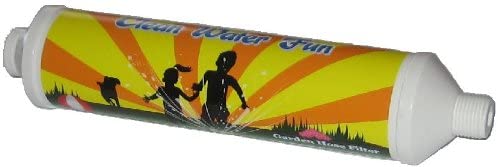
This best garden hose filter will attach to most standard garden hoses and works for up to 10,000 gallons. It employs catalytic carbon for its antibacterial properties rather than copper, and the body features polypropylene and plastic. While not safe to drink, it works great for your garden.
Clean Water for Fun had third-party testing on its filter’s capabilities. It claims to reduce organic chemicals by 99% and chloramines by 97%, which most standard filters cannot do. However, some users found that while it reduced chloramines significantly, the filter reduced them by 90% rather than 97%.
They use carbon made from a coconut shell and activate it with a steam-activation process. Activation creates millions of surface micro-pores to increase the surface area. Then, the carbon receives a catalyst coating that breaks the ammonia and chlorine bond, eliminating chloramines.
The catalytic carbon filter adsorbs TCE, MTBE, PCE, ammonia, chlorine, chloramines, disinfectants, pesticides, herbicides, and trace-level organic matter. It has a durable polypropylene body to last you a long time.
You will need a quick connector if you want to use the filter daily. Two sets of connectors will let you easily attach and detach it from your hose, making it more suitable for a home irrigation system. Clean Water for Fun designed the filter for watering your garden, not for ponds or aquariums, though many buyers have found no issue with using it for those purposes.
This American-made filter can make a great addition to your garden, though it will not kill microorganisms. However, if you live in an area with decent water quality but have encountered chloramines, you will benefit from this filter.
- Undergone third-party testing
- Attaches to standard garden hoses
- Uses catalytic copper to eliminate chemicals
- Significantly reduces quantities of chlorine, chloramines, pesticides, herbicides, sediments, disinfectants, and ammonia from your water
- Durable construction
- Readily affordable
- It does not protect against bacteria or viruses
- 10,000-gallon max capacity
- Requires quick connectors
3. Garden Pure Carbon Water Hose Filter
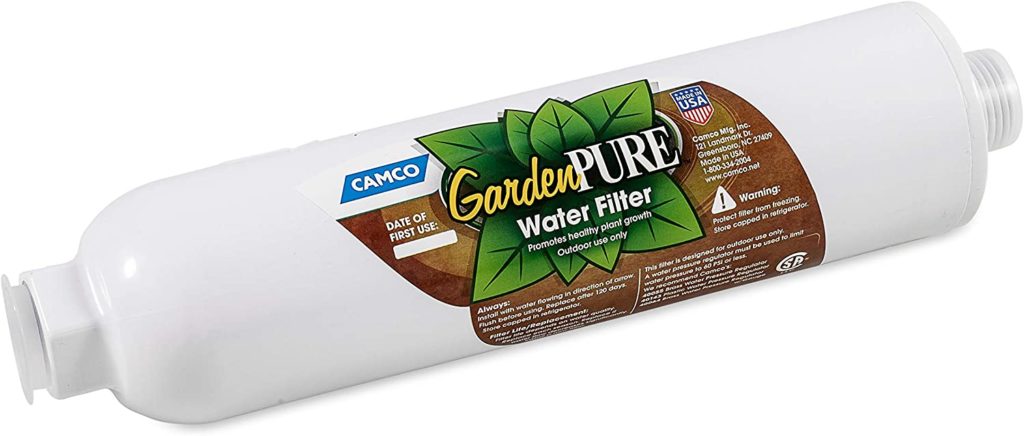
This garden hose water filtration system works well with organic, hydroponic, and aeroponic gardens. It filters harmful compounds out of the water to improve your soil and plant health. Since hydroponic and aeroponic systems have water in direct contact with the roots, you will need to filter chlorine and chloramines to protect the soil’s beneficial bacteria.
The Garden Pure Carbon Water Filter uses GAC filtration to cleanse your water of aluminum, hydrogen sulfide, mercury, lead, chlorine, chloramines, and heavy metals. It does have a slower flow rate of one gallon per minute, but it’s safe for livestock, pets, compost, and houseplants. Also, you will need to replace it more frequently due to its 1,000-gallon capacity. Nevertheless, if you have a smaller garden, it should meet your filtration needs for a while.
- It fits easily on standard hoses
- Durable plastic construction
- Easy to install and use
- Protects soil bacteria
- Mixed results with chlorine filtration: some users noticed a significant difference while others found it left a chlorine smell
- Small 1,000-gallon capacity
- No money-back guarantees or warranty
4. LOVHO Sediment Filter
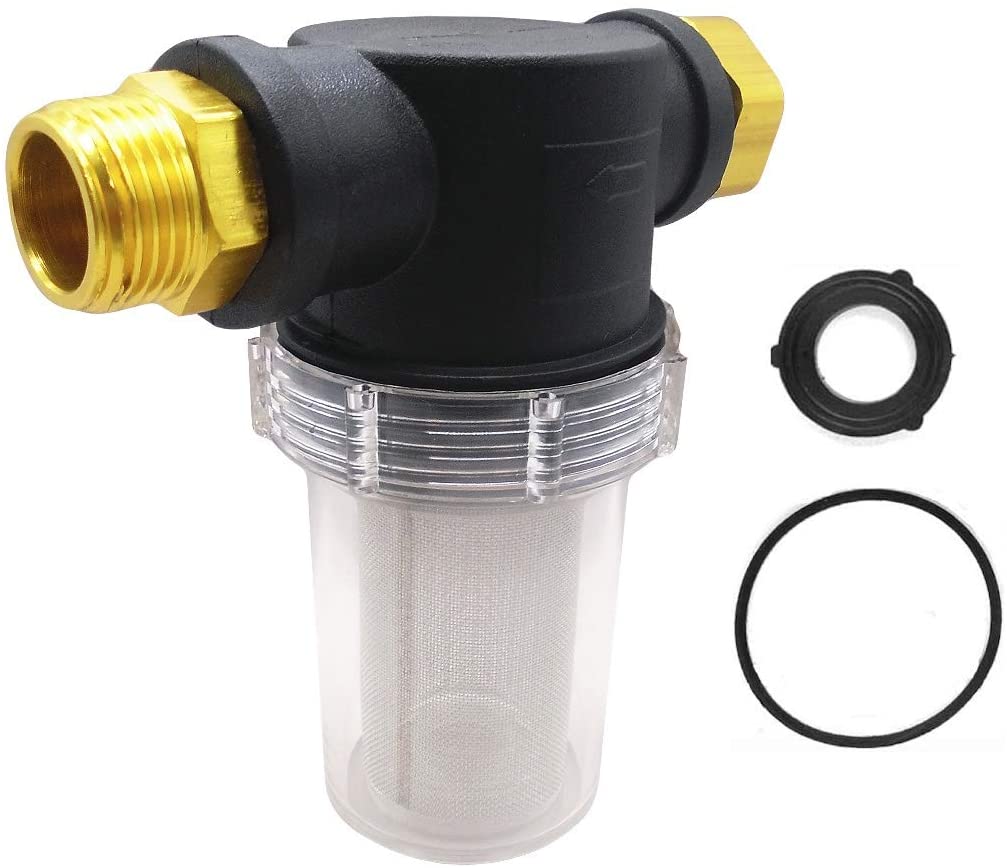
The LOVHO water filter for garden hose also connects to your pressure washer inlet or home water spigot to remove sediments from the water supply, protecting your gear. LOVHO designed this filter for rural households, small farms, and those who use well water.
Since it is a sediment filter, it will not remove chlorine or chloramines. It will not work for you if you water your plants with city water. However, if you are more concerned with excess sediments or have a finer filter to purify chemicals, then you may find some merit in this option. It has a durable metal coupler and body construction, and it works at any flow rate with a max of 80 psi hose pressure.
The customer service is highly responsive, and they will replace your broken filter if needed. They recommend their 100 mesh sediment filter to remove more materials. If you have troubles with the 40 mesh filter, they will upgrade you to another option. LOVHO also helps you install, clean, and replace parts to give you the best possible experience with their products.
- Inexpensive with a high value
- Filters sediments from well water
- Excellent customer service
- Works in tandem with finer filters
- You can clean it instead of replacing it, saving you more money
- Takes any flow rate as long as the pressure is below 80 psi
- It does not have a max water capacity
- Does not filter chemicals or compounds
- Requires another filter for safe use in gardens
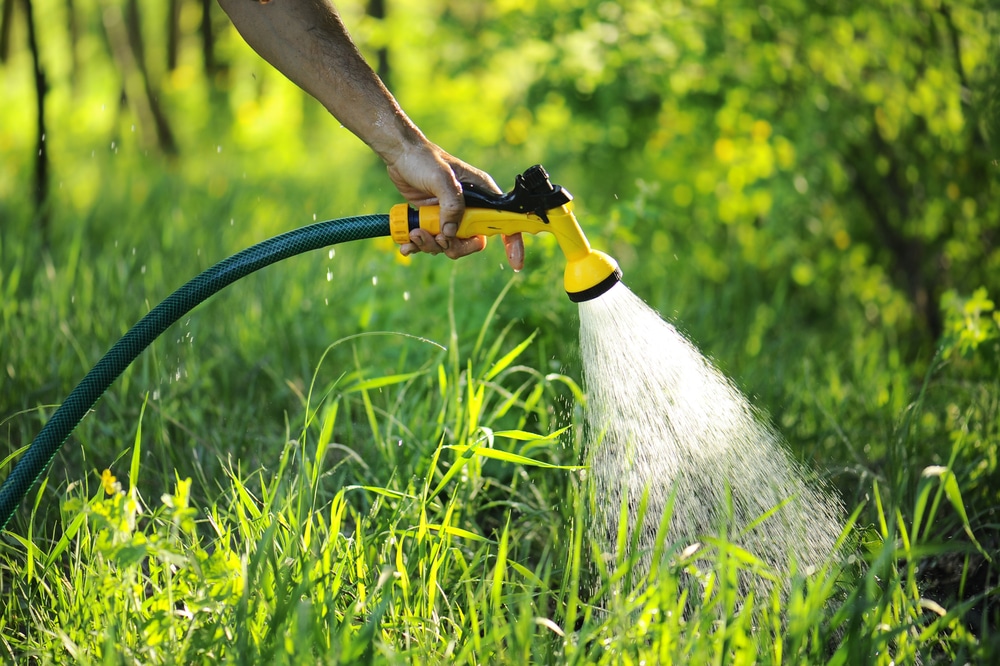
First Time Buyer’s Guide: How to Buy Right
When choosing your first water filter for a garden hose, you’ll want to keep a few factors in mind.
Filter Materials
If you’re looking for a garden hose filter to keep dirt, sediments, rocks, and other debris out of your water supply, then you would succeed with a sediment filter. The higher the mesh value, the more that it can filter. For instance, the 40 mesh LOVHO Sediment Filter will leave in smaller organic particles than the 100 mesh because of its larger holes.
For those who use the city water for their garden, you probably face added chlorine and chloramines designed to kill germs and disease; however, these chemicals can kill your plants and disturb the ecosystem, so that you will need a higher quality filter. The best garden hose filters use some form of activated elements to disinfect the water.
Engineering developments in nanotechnology have improved water filtration systems. Copper, carbon, silver, and combinations of the three materials have antimicrobial properties that can kill bacteria and separate chlorine and chloramines from the water. By doping the filter media with a copper-, carbon-, or silver-based compound, one can create a powerful disinfectant that maintains water safety.
The AquaOx, Clean Water for Fun, and Garden Pure filters all use activated carbon to eliminate chlorine. Its porous structure captures chlorine, ammonia, commercial disinfectant byproducts, pesticides, and herbicides from the water supply to prevent them from getting to your plants. Nevertheless, the GAC alone does not kill bacteria and viruses.
Some studies have shown that graphitic carbon nitride could replace chlorine in standard filtration systems as it protects the environment and eliminates bacteria, but this research is young. AquaOx developed their Quantum Disinfectant technology using silver as a disinfectant because of its antibacterial, antiviral, and antiprotozoal properties. When combined with GAC, this filter can virtually eliminate all damaging compounds from your water.
Size
You could get the highest quality materials in the world, but you will not be able to use them unless you choose the right size. The filters mentioned above are compatible with standard garden hoses. If you have an unusually sized hose, you will need to research special filters for it.
An overly large filter could lead to leakage, and it may not filter the harmful substances well. A too-small filter could damage your hose as it may cause blockages. Ensure you measure your hose before investing in a filter, as the wrong size could cause a lot of trouble in your backyard.
Extra Features
While you don’t need bells and whistles on your water filter, they could make it more convenient. Some filters have buttons for easy activation without having to attach and detach them with every use. You may want to buy quick connectors if you plan on using your filter regularly as they accelerate the installation process. Activation buttons can add a lot to the cost, so make sure you’re willing to sacrifice some cash for a few minutes saved.
FAQs: What Questions Are Other Buyers Asking?
Other buyers have a few frequently asked questions that we will discuss below.
A hose filter is an attachment for your garden hose that can eliminate debris, chemicals, and sometimes bacteria from your water supply. It protects your plants by destroying dangerous compounds like chloramines that could kill them.
Standard sediment garden hose filters can remove organic matter from well water to avoid dirtying your plant. You will need a filter with cleansing properties to eliminate the chlorine used to treat the water supply for those who live in cities.
A garden hose filter can save you money in the long run by keeping your plants alive and well so that you won’t need to buy new ones. Furthermore, it protects your backyard’s ecosystem to keep beneficial plants, animals, and insects alive, and you can use it for pools and your pets’ drinking water.
Impurities like chlorine and iron can disturb the water’s pH and make it too acidic for your plants. Filters will make the water more alkaline to maintain the natural electrolyte balance between the plants and roots. Clean water can help your plants prosper.
By installing one of the best inline garden hose filters, you can filter hose water. For example, the Clean Water for Fun filter claims to remove 99% of chlorine and 97% of chloramines from the water, creating a safer source for your plants. The AquaOx filter can reportedly remove 99.999% of bacteria and viruses.
While you can filter hose water, it is not necessarily safe to drink as garden hoses can have a few toxins, such as BPA, lead, phthalates, and antimony. Even if you choose the best garden hose filter and have pristine water, the hose itself can add impurities that make it dangerous for human consumption. Some do claim to be drinking water safe, so check with the manufacturer before consuming from it.
If you live in a city, there’s a high chance that your hose water has chlorine. They add chlorine to kill viruses and bacteria, and a home filtration system will eliminate the tap water’s chlorine smell and taste. However, this chemical can kill your plants as it disturbs the soil’s pH levels and harms pollinators.
Many large cities have begun adding chloramine to their water supplies for further decontamination. These ammonia and chlorine compounds are more challenging to remove than chlorine, and they can wreak more havoc on your plants.
While the levels of chlorine and chloramines used in city water supplies are safe for drinking, they can harm your plants and pollute the environment. Also, they add an unusual taste and smell, rendering it unpleasant for consumption.
By investing in a water filter, you can protect your backyard and create a more enjoyable environment for your family to enjoy. If you notice your flowers looking dull, chlorine could be the culprit. Check out the chlorine levels of your city water and invest in bettering your backyard today.
Conclusion
Above we covered some of the most incredible filters available today. The best garden hose filter depends on your backyard’s needs, but you can still consider some of the options mentioned to protect your garden.
If you only want to filter debris, you should find success with the LOVHO Sediment Filter. It comes in various sizes to clean water that enters your hose or pressure washer. This filter is ideal for those who live in rural areas or use well water uncontaminated by chlorine.
For those with a bigger budget who want to eliminate every potentially harmful component in their water supply, you should consider the AquaOx Garden Hose Filter. This advanced filter uses Quantum Disinfectant technology that combines silver and carbon to kill all microorganisms on-site and remove various contaminants.
If your primary concern is chlorine and chloramines, then the Garden Pure Carbon Water Hose Filter and Clean Water for Fun Garden Hose Filter should stay on your radar. These carbon-based filters can significantly reduce chlorine and chloramine levels while also cutting out aluminum, mercury, lead, heavy metals, pesticides, herbicides, disinfectant byproducts, and many other dissolved compounds invading your water supply.
All in all, if you have a garden, you will want to invest in a garden hose filter. It can improve your plants’ vitality and protect your backyard’s ecosystem by attaching to your hose.

